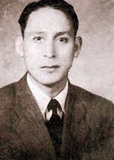
高一生(1908-1954),鄒族名為Uyongu Yatauyungana,教師、作曲家。出生於阿里山鄒族部落。臺南師範學校(今國立臺南大學)畢業,返回達邦蕃童教育所任教,投身族人教育、衛生、農事、經濟等改善工作。協助俄國學者聶夫斯基編寫特富野部落語言及民間文學的調查,並創作以日語或鄒族語吟唱的歌曲,在西式音樂教育影響下,呈現原住民傳統音樂元素。1945年後,高一生接受委派任臺南縣吳鳳鄉的首任鄉長,參與部落改造,主張鄒族語言、文化的記錄與保存。因二二八事件協助涉案者避難及倡導原住民高山自治縣之理念,1954年以匪諜叛亂罪遭到槍決,成為白色恐怖時期受難的原住民菁英之一。高一生的創作開啟鄒族近代歌曲的先河,代表作為〈春之佐保姬〉、〈杜鵑山〉、〈長春花〉、〈古道〉、〈登上玉山〉、〈遷往南方之地〉。
GAO Yi-Sheng (Uyongu Yatauyungana) was born in Chiayi in 1908. He was a major advocate for the Tsou Aboriginal movement, and was also a renowned songwriter and poet. He combined traditional Tsou culture with the Western philosophical thought he learned from his Japanese education. He wrote songs that were uniquely Taiwanese, usually about nature, including the mountains and the forests. As a student, he had a modern Western music education. Gao enjoyed playing piano. He taught in Alishan and wrote many songs to teach to his students. After the Chinese Nationalist Party took over Taiwan, he became a major advocate for the Aboriginal autonomy movement. Due to the Second White Terror of the 1950s, he was sentenced to the death penalty and executed in 1954.
